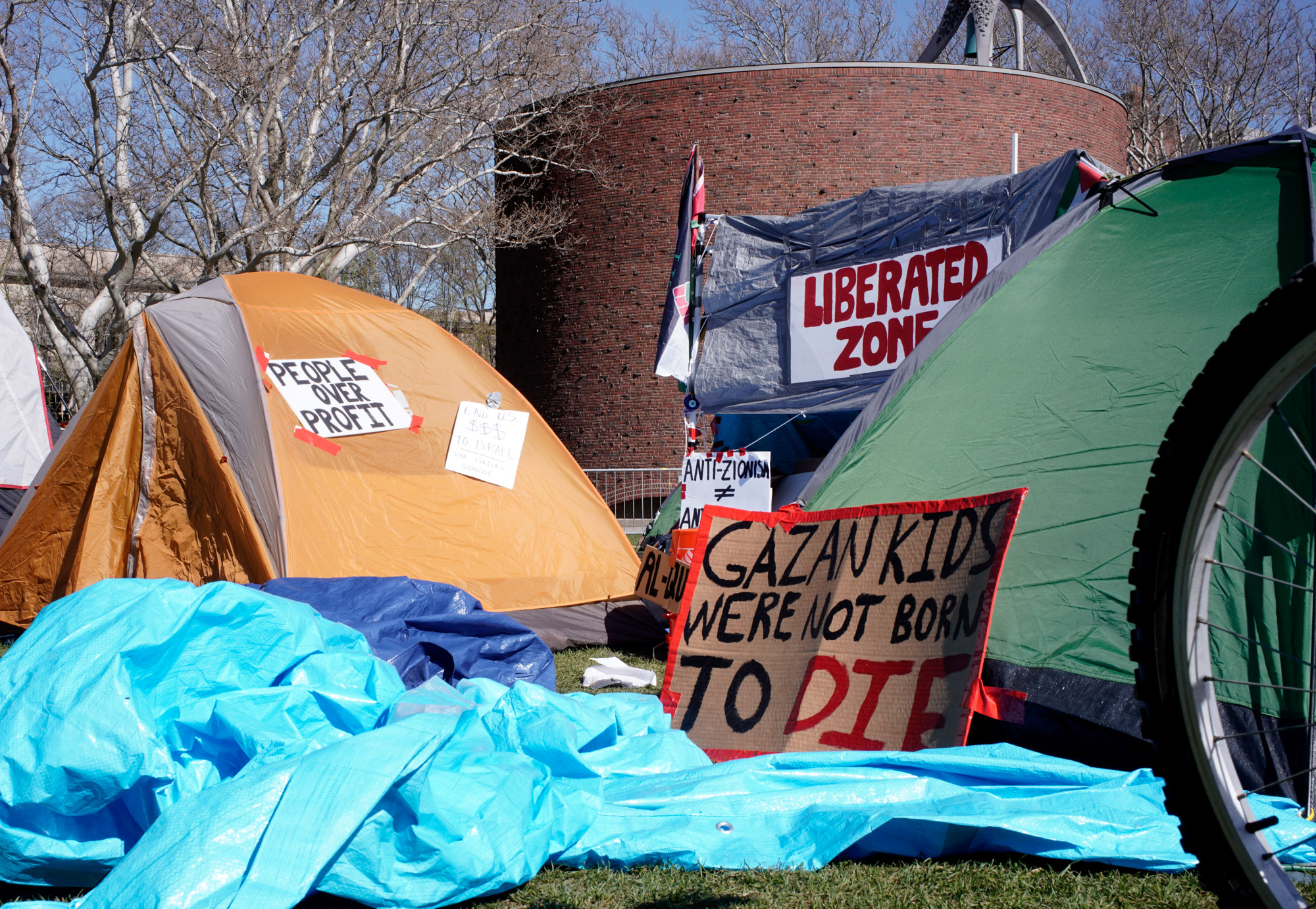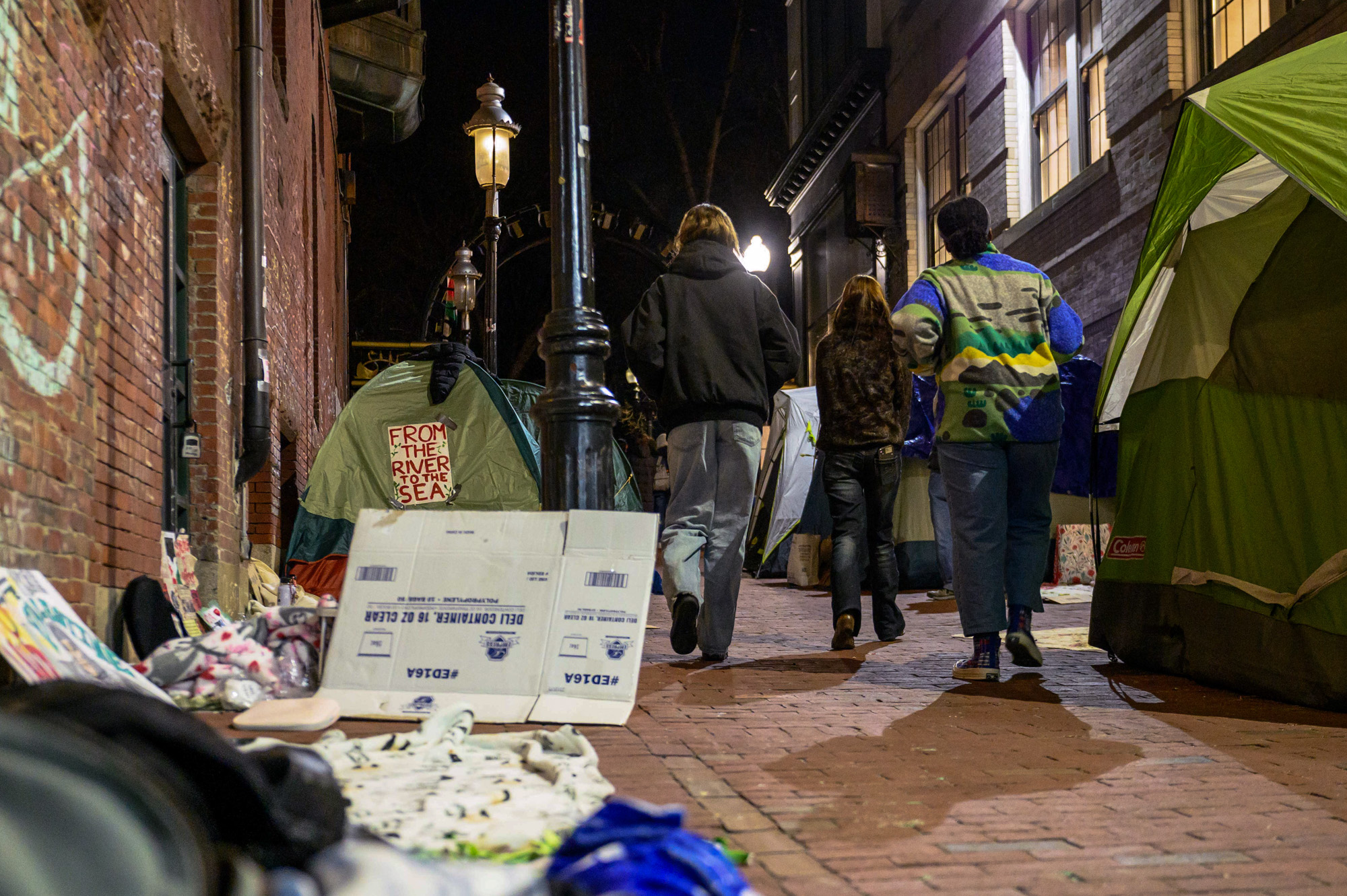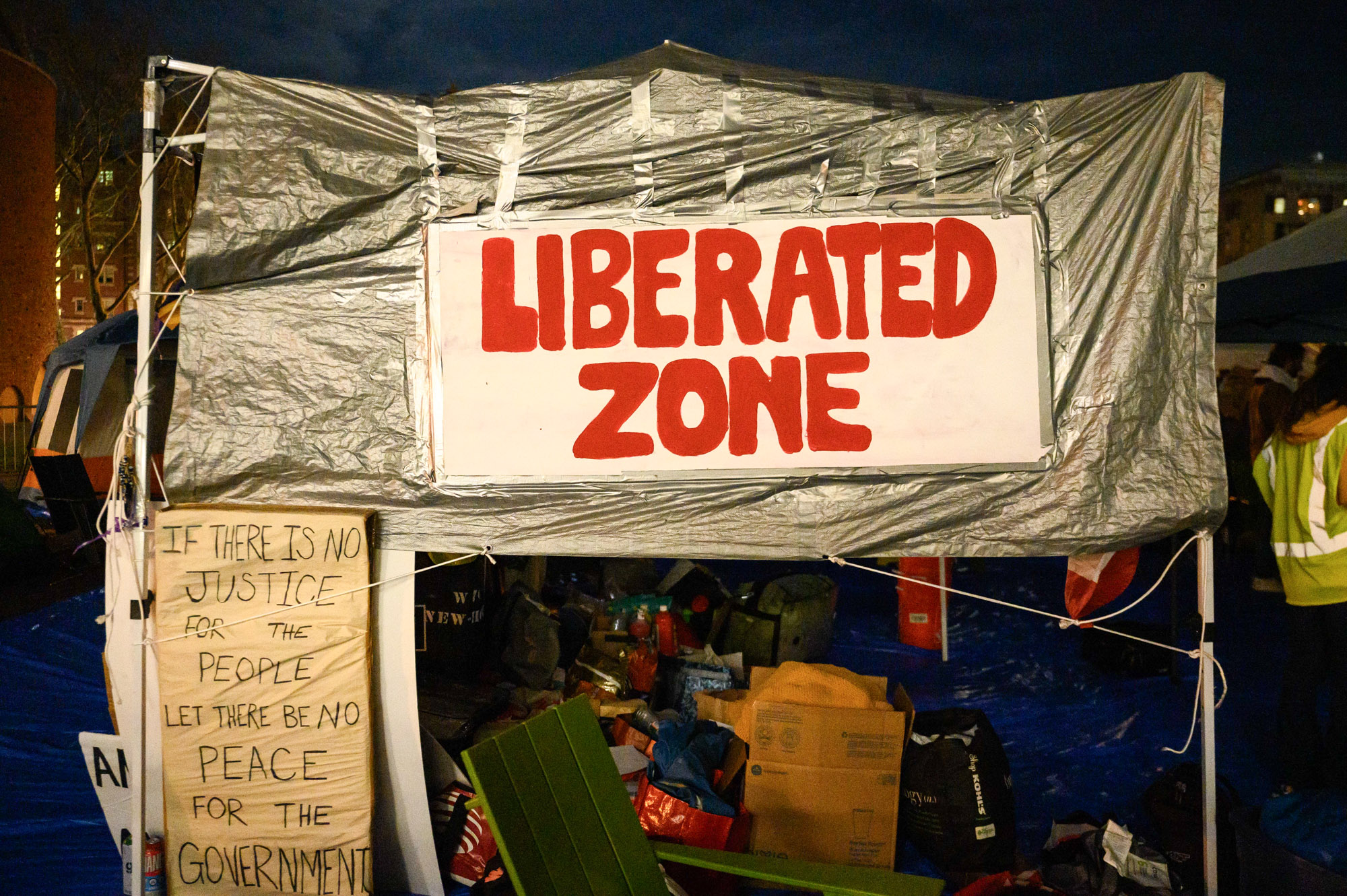Arrests at Emerson College on Thursday have shaken the student body and neighboring Boston colleges after police swarmed an encampment organized by students and community members in solidarity with Palestine.
At around 2 a.m. on Thursday, dozens of police officers broke up a tent encampment in the 2 Boylston St. alley and arrested 118 people, according to WCVB. Seven Boston University students were among those arrested, a source said.

Police, wearing riot gear and wielding wooden batons, flooded the encampment before forcibly removing protesters. Some protesters were thrown to the ground before being pinned down by officers, according to videos posted to social media.
Bia Dahlberg, a teacher and Boston resident, was arrested at the protest and spent the night in custody before being released this morning.
“It’s being covered as non-violent and [that] police weren’t brutally arresting people, and that is completely and utterly false,” Dahlberg said, saying she knew detained people who had not been given medical attention and someone who was choked unconscious.
David Berkinsky, a graduate student at MIT who was at the Emerson students’ encampment last night, said many showed up to support the demonstration. He said “there was a very sudden shift” when police forces approached around the corner “out of nowhere” to disband the encampment.
“They were just looking to cause as much chaos as possible,” Berkinsky said. “They gave us maybe a minute or two to decide [what to do], which was, frankly, not a lot of time.”
Berkinsky said Emerson police dragged and threw him by his backpack. He said he watched videos the following morning of public workers cleaning blood off of the sidewalk and walls of 2B.
“You don’t need that violent response. It’s so disproportionate,” Berkinsky said of the police action toward the student protests.
Arrested students were detained overnight in various precincts — a bail fund was organized by Emerson students and faculty, and all have since been released. Four people were sent to nearby hospitals with injuries, according to the Boston Globe, but the details remain unclear.
This morning, the alley showed little evidence of last night’s events. The walls were power washed and the belongings of arrested students had been shuttled to a nearby building for collection. Signs calling for “no loitering” have been pasted along the walls by police.
“Seeing it now is crazy because it’s hauntingly quiet,” said James Thomson, a senior at Emerson.
In an email to the Emerson community, Emerson president Jay Bernhardt wrote the college “recognizes and respects the civic activism and passion that sparked the protest in Boylston Park Alley in support of Palestine while also holding and communicating concerns related to the numerous ordinance violations caused by their encampment.”
Thomson described Bernhardt’s email as a “nothing burger.”
“[The email] did acknowledge the [night] but also didn’t say nearly enough,” he said. “He didn’t acknowledge at all … how violent and brutal [it was].”
In the morning after the arrests at Emerson, an encampment at Northeastern University went up on the Centennial Quad and was later approached by law enforcement.
Police closed in on the encampment just after 2:30 p.m., surrounding the protesters who crouched arm in arm, forming a circle around their tents and supplies and chanting, “Who do you serve, who do you protect?”
15 minutes later, the riot police disbanded and left the scene, leaving around two dozen officers to continue policing the area.

Students protesting on the quad were in violation of the university’s code of conduct, said Renata Nyul, Northeastern’s vice president for communications, in a statement to the Huntington News, Northeastern University’s campus newspaper.
“I remember Northeastern telling me that this was an open campus and we’re a part of the city,” said Northeastern senior August Escandon, reflecting on touring as a prospective student. “It doesn’t feel part of the city now because I’ve been kicked to the sidewalk by police officers with guns.”
Students at Harvard and MIT today were outraged by the arrests at Emerson last night but showed few signs of packing up their encampments.
Police presence surrounding 15 tents slowly grew in the center of Kresge lawn at MIT this afternoon. There were around half a dozen police officers present by 4 p.m.
Berkinsky, who is also a member of MIT Jews for Ceasefire, said the escalation of police presence at Emerson and Northeastern has forced students to consider how to protect themselves.
“That encampment [at Emerson] was quite unique because of the narrow corridor it existed in, so it would be different here,” Berkinsky said of police forces possibly escalating at MIT, adding later, “We’re just going to try to keep each other safe.”
Harvard Yard was inaccessible to those without Harvard IDs Thursday afternoon. Students and faculty were seen flashing their passes to guards posted at gate entrances surrounding the lawn.
The encampment at Harvard tripled from its original size by the end of Thursday, according to Harvard Graduate Students for Palestine’s Instagram account. The encampment went up on Wednesday following Harvard’s suspension of the Palestine Solidarity Committee earlier this week.
“We have been clear that the physical safety and well-being of our community is paramount, and we have taken steps to increase security,” Harvard Dean of Students Thomas Dunne wrote in an email to students. “We are also committed to supporting free speech, including the right to protest.”
Dunne continued to say that this right exists alongside “time, place, and manner restrictions” and that “interference with the academic mission or business functions of the University will not be tolerated.”
Violet Barron, a sophomore at Harvard College, said the police treatment of Emerson students was “heinous,” but she wasn’t surprised given the events on college campuses around the U.S. this week.
“This is how schools respond to pro-Palestine stuff, and I think another example of the Palestine exception where you just see disproportionate force and scrutiny applied to any sort of rhetoric or action that’s pushing for Palestinian liberation,” Barron said.
Barron said she thinks Harvard University administration seemed “hesitant” to use force to remove students from the encampment, but also said “you can’t ever trust admin or police.”
“Of course, we’re always aware of risk and trying to ensure something like that doesn’t happen here,” Barron said.

As encampments pop up in solidarity with Palestine at universities across the United States, the deployment of police has led to hundreds of arrests. Students were forcibly removed from protests at Columbia University, University of Texas at Austin and the University of Southern California, sparking outrage amongst students in support of Palestine nationwide.
Though there is no longer an encampment at Emerson, several encampments still stand at universities around Greater Boston. Tents remain at MIT, Northeastern, Tufts and Harvard. Lights were projected against Harvard walls Thursday night that read phrases like “Divest Harvard” and “Free Gaza.”
Mayor Wu has defended Boston police’s handling of the protest at Emerson, telling the Boston Globe “there were safety concerns and the safety risks were growing as more and more obstruction of the public way took place.”
It is unknown who ultimately decided to send police into the alley.
“We know that depending on the will of these institutions, they can crack down and decide that what we’re fighting for … to challenge institutions complicity to a genocide, is too much of a burden, too much of an eyesore,” Berkinsky said. “They’re willing to get rid of us by force.”
CORRECTION: A previous version of this article said that 108 Emerson students have been arrested, before the number was updated. The article has been updated to reflect this change.























































































































Gary • Apr 30, 2024 at 12:21 am
“When people criticize Zionists, they mean Jews. You’re talking anti-Semitism.”
– Also Martin Luther King, “Letter to an Anti-Zionist Friend”
Jenny • Apr 26, 2024 at 8:37 pm
One who breaks an unjust law must do so openly, lovingly, and with a willingness to accept the penalty. I submit that an individual who breaks a law that conscience tells him is unjust, and who willingly accepts the penalty of imprisonment in order to arouse the conscience of the community over its injustice, is in reality expressing the highest respect for law.
– Martin Luther King, Jr., Letter from Birmingham Jail (1963).
Roheim Bux • Apr 26, 2024 at 9:59 am
Well done students of boston Welsh people from Wales UK applaud you stop this horrendous genocide now shame on you usa and Britain
Shiney Marquez • Apr 26, 2024 at 9:42 am
Good job Jewel